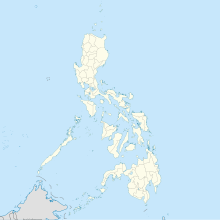Clark Field
| Clark Air Base | |
|---|---|
| Part of United States Air Force and Philippine Air Force | |
| Located at Clark Freeport Zone, Philippines | |

Clark Air Base in 1989 as part of United States Pacific Air Forces
|
|
| Coordinates | 15°11′09″N 120°33′35″E / 15.18583°N 120.55972°E |
| Type | Air Base |
| Site information | |
| Owner |
|
| Controlled by |
|
| Condition | Renovated |
| Site history | |
| Built | 1 September 1903 |
| Built by |
|
| In use | 1903–1991, 2016-present (United States) 1992–present (Philippines) |
| Garrison information | |
| Garrison |
|
| Airfield information | |||||||||||||||
|---|---|---|---|---|---|---|---|---|---|---|---|---|---|---|---|
| Summary | |||||||||||||||
| Elevation AMSL | 484 ft / 148 m | ||||||||||||||
| Coordinates | 15°11′09″N 120°33′35″E / 15.18583°N 120.55972°ECoordinates: 15°11′09″N 120°33′35″E / 15.18583°N 120.55972°E | ||||||||||||||
| Map | |||||||||||||||
| Location of Clark Air Base in the Philippines | |||||||||||||||
| Runways | |||||||||||||||
|
|||||||||||||||
Clark Air Base is a Philippine Air Force base on Luzon Island in the Philippines, located 3 miles west of Angeles, about 40 miles northwest of Metro Manila. Clark Air Base was previously a United States military facility, operated by the U.S. Air Force under the aegis of Pacific Air Forces (PACAF) and their predecessor organizations from 1903 to 1991. The base covered 14.3 square miles (37 km²) with a military reservation extending north that covered another 230 square miles (596 km²).
The base was a stronghold of the combined Filipino and American forces during the end of World War II and a backbone of logistical support during the Vietnam War until 1975. Following the departure of American forces in 1991, the base eventually became the site of Clark International Airport, the Clark Freeport Zone and the Air Force City of the Philippine Air Force.
In April 2016, an "Air Contingent" of USAF A-10s and HH-60s was deployed from U.S. air bases in Pyeongtaek and Okinawa to Clark. The Air Contingent was composed of five A-10C Thunderbolt IIs from the 51st Fighter Wing, Osan AB, South Korea; three HH-60G Pave Hawks from the 18th Wing, Kadena AB, Japan; and approximately 200 personnel deployed from multiple Pacific Air Force units. The primary mission of the contingent appears to be to patrol disputed South China Sea islands, "to provide greater and more transparent air and maritime domain awareness to ensure safety for military and civilian activities in international waters and airspace." The air contingent builds upon previous deployments by U.S. Navy P-8 Poseidon aircraft to Clark.
...
Wikipedia

